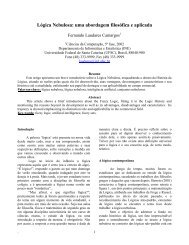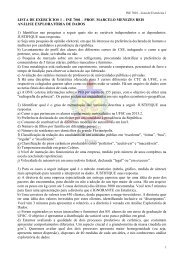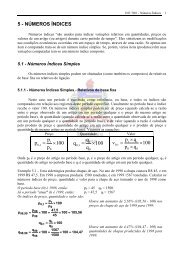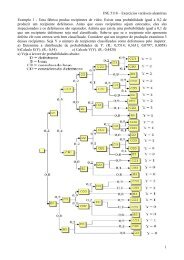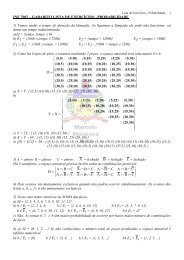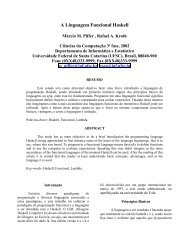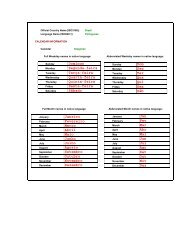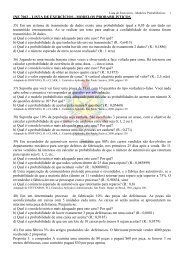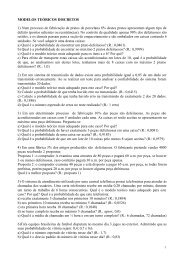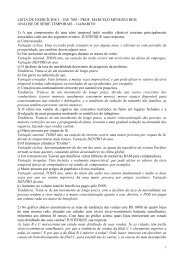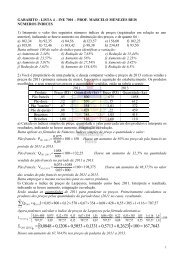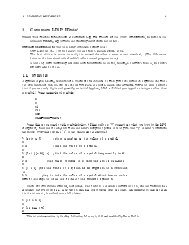Anais do IHC'2001 - Departamento de Informática e Estatística - UFSC
Anais do IHC'2001 - Departamento de Informática e Estatística - UFSC
Anais do IHC'2001 - Departamento de Informática e Estatística - UFSC
Create successful ePaper yourself
Turn your PDF publications into a flip-book with our unique Google optimized e-Paper software.
<strong>Anais</strong> <strong>do</strong> IHC’2001 - IV Workshop sobre Fatores Humanos em Sistemas Computacionais 183<br />
Personal and group spaces: Integrating<br />
resources for users of digital libraries<br />
J. Alfre<strong>do</strong> Sánchez, Carlos Proal, Dámaris Pérez, Ana R. Carballo<br />
Library and Center for Research in Information and Automation Technologies of the<br />
Universidad <strong>de</strong> las Américas-Puebla<br />
A.P. 100 UDLA-P Cholula, Pue. 72820 México<br />
{alfre<strong>do</strong>, carlos, sp098867, carballo}@ mail.udlap.mx<br />
Abstract. This paper presents an approach to integrate highly diverse resources<br />
available in digital libraries via personalizable interfaces and virtual<br />
collaboration areas. Digital libraries comprise vast digital repositories and a<br />
wi<strong>de</strong> range of services, user environments and interfaces, all inten<strong>de</strong>d to support<br />
learning and collaborative research activities. We are <strong>de</strong>veloping a distributed<br />
digital library for which services and interfaces inclu<strong>de</strong>, for example, mobile<br />
agents for fe<strong>de</strong>rated information retrieval, recommendation agents, 3D<br />
visualization aids, and access to digital <strong>do</strong>cuments that support specific courses<br />
and projects. The diversity of these interfaces, plus the volume and dynamism of<br />
the digital library’s un<strong>de</strong>rlying collections, result in a complexity that has the<br />
potential to make the digital library unwieldy for the user. In or<strong>de</strong>r to assist users<br />
in <strong>de</strong>aling with this complexity, we have <strong>de</strong>signed environments, termed personal<br />
and group spaces, which provi<strong>de</strong> users with means to access and control all<br />
available resources in a uniform fashion from a single vantage point. We discuss<br />
our <strong>de</strong>sign and <strong>de</strong>velopment experiences as well as initial usage results.<br />
Keywords: personalized interfaces, collaborative interfaces, digital libraries, personal<br />
spaces, group spaces, agents.<br />
1. Introduction.<br />
The systems we have come to know as “digital libraries” are not really libraries in the usual<br />
sense. The abstractions of content and services that generally <strong>de</strong>scribe physical libraries<br />
have been used by researchers to convey some of the functionality enabled by digital<br />
libraries, but this metaphor <strong>do</strong>es not even suggest the major differences that the<br />
introduction of a new medium entails. In addition to a new substrate, digital libraries<br />
comprise new information units and genres, allow for multiple novel organization schemes,<br />
and make diverse browsing and searching mechanisms possible. Users of digital libraries<br />
require new skills, new tools and new interfaces to cope with the complexity of such a<br />
diverse system and to fully exploit its potential.<br />
This paper analyzes some of the major problems faced by users when using collections and<br />
services provi<strong>de</strong>d by digital libraries and presents an approach for the integration of digital<br />
library resources which is based on the concepts of personal and collaboration spaces. We<br />
posit that users should have at their disposal means to create virtual areas within the digital<br />
library in which they (or their agents) can place information objects that are relevant to<br />
their interests and ongoing tasks. We refer to this sort of virtual place as a personal space.<br />
Additionally, digital libraries should also provi<strong>de</strong> users (usually working remotely) with



